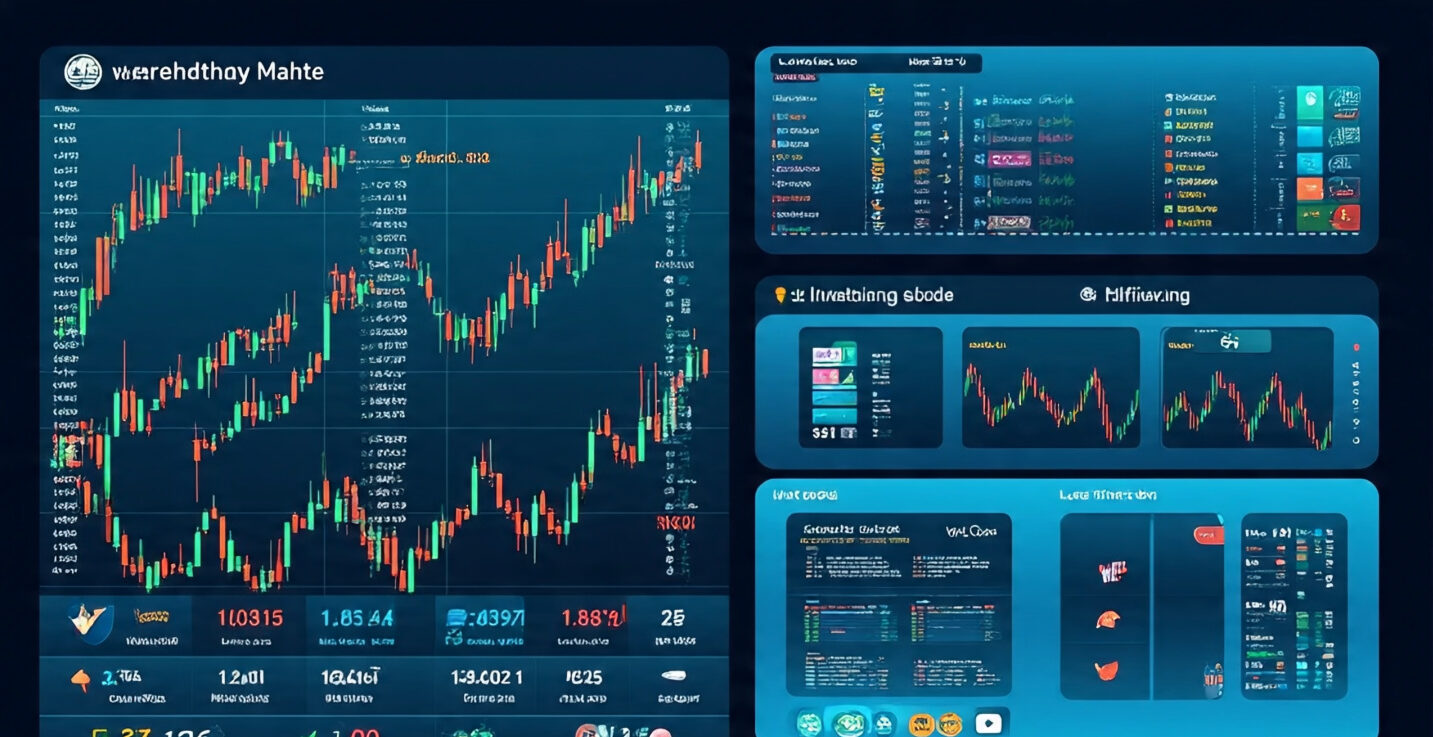Choosing the right Bitcoin trading platform can make the difference between profitable trades and costly mistakes. With cryptocurrency adoption reaching new heights in 2025, finding a reliable platform has become crucial for both beginners and experienced traders. Whether you’re looking to buy your first Bitcoin or execute complex trading strategies, the platform you choose will significantly impact your trading experience and potential returns.
The cryptocurrency market operates 24/7 and having access to a robust Bitcoin trading platform ensures you never miss profitable opportunities. From user-friendly interfaces for newcomers to advanced charting tools for professional traders, modern platforms offer diverse features to meet every trader’s needs. Security, fees, supported cryptocurrencies and regulatory compliance are just some of the critical factors that separate excellent platforms from mediocre ones.
What is a Bitcoin Trading Platform?
A Bitcoin trading platform is a digital marketplace where users can buy, sell and trade Bitcoin and other cryptocurrencies. These platforms act as intermediaries, connecting buyers and sellers while providing essential tools for market analysis order execution and portfolio management.
Modern trading platforms have evolved far beyond simple buy-and-sell interfaces. Today’s sophisticated platforms offer advanced features such as margin trading, futures contracts, automated trading bots and comprehensive market analysis tools. The best platforms combine user-friendly design with professional-grade functionality, making cryptocurrency trading accessible to everyone.
Types of Bitcoin Trading Platforms
Centralized Exchanges (CEXs) are the most popular type, offering high liquidity, user-friendly interfaces and customer support. Examples include Coinbase, Binance and Kraken.
Decentralized Exchanges (DEXs) operate without a central authority, giving users complete control over their funds. Popular DEXs include Uniswap and SushiSwap.
Peer-to-Peer (P2P) Platforms connect traders directly, allowing them to negotiate prices and payment methods. LocalBitcoins and Paxful are well-known P2P platforms.
Hybrid Platforms combine features from different types, offering the benefits of centralized and decentralized systems.
How to Choose the Best Bitcoin Trading Platform
Security Features
Security should be your top priority when selecting a Bitcoin trading platform. Look for platforms that implement multi-factor authentication, cold storage for funds and regular security audits. The best platforms use bank-grade encryption and maintain insurance policies to protect user funds.
Regulatory compliance is another crucial security aspect. Platforms licensed in reputable jurisdictions like the US, UK or Singapore typically follow strict security protocols and financial regulations.
Trading Fees and Costs
Fee structures is essential for profitable trading. Most platforms charge maker and taker fees, which vary based on trading volume and account tier. Some platforms offer zero-fee trading for certain cryptocurrencies or trading pairs.
Consider these fee types:
- Trading fees (maker/taker fees)
- Deposit and withdrawal fees
- Spread costs
- Inactivity fees
- Currency conversion fees
User Interface and Experience
A well-designed interface can significantly improve your trading efficiency. Beginners should prioritize platforms with intuitive navigation and educational resources, while experienced traders might prefer advanced charting tools and customizable dashboards.
Mobile apps are increasingly important, allowing traders to monitor markets and execute trades on the go. The best platforms offer feature-rich mobile applications that mirror their desktop functionality.
Top Bitcoin Trading Platforms in 2025
Coinbase Best for Beginners
Coinbase remains the most user-friendly Bitcoin trading platform for newcomers. Its clean interface, educational resources and strong regulatory compliance make it an excellent choice for first-time crypto buyers.
Key Features:
- Intuitive user interface
- Educational resources and tutorials
- Strong security measures
- Insurance coverage for digital assets
- Wide range of supported cryptocurrencies
Pros: Easy to use, excellent customer support, high liquidity Cons: Higher fees compared to alternatives, limited advanced trading features
Binance Best Overall Trading Experience
Binance offers the most comprehensive Bitcoin trading platform with extensive features for both beginners and professionals. Its high liquidity, low fees and diverse trading options make it a top choice globally.
Key Features:
- Lowest trading fees in the industry
- Extensive cryptocurrency selection
- Advanced trading tools and charts
- Multiple order types
- Mobile and desktop applications
Pros: Low fees, high liquidity, comprehensive features Cons: Complex interface for beginners, regulatory challenges in some regions
Kraken Best for Security and Compliance
Kraken has built a reputation as one of the most secure and transparent Bitcoin trading platforms. Its strong regulatory compliance and advanced security features make it popular among institutional investors.
Key Features:
- Advanced security protocols
- Regulatory compliance
- Professional trading tools
- Margin trading capabilities
- 24/7 customer support
Pros: Excellent security, regulatory compliance, professional features Cons: Complex fee structure, limited payment options in some regions
Advanced Trading Features to Consider

Margin Trading
Margin trading allows you to borrow funds to increase your position size, potentially amplifying profits. However, it also increases risk and losses can exceed your initial investment. Only experienced traders should consider margin trading on a Bitcoin trading platform.
Automated Trading Tools
Many platforms now offer automated trading features, including:
- Trading bots for executing predefined strategies
- Dollar-cost averaging (DCA) for regular purchases
- Stop-loss and take-profit orders for risk management
- Copy trading to mirror successful traders’ strategies
Technical Analysis Tools
Professional traders need comprehensive charting and analysis tools. Look for platforms offering:
- Multiple chart types and timeframes
- Technical indicators and overlays
- Drawing tools for market analysis
- Historical data and backtesting capabilities
Security Best Practices for Bitcoin Trading
Two-Factor Authentication (2FA)
Enable 2FA on your Bitcoin trading platform account immediately. Use authenticator apps rather than SMS for better security. This simple step can prevent most unauthorized access attempts.
Cold Storage and Withdrawals
While convenient, keeping large amounts of Bitcoin on any trading platform increases risk. Consider withdrawing funds to a hardware wallet for long-term storage. Only keep the amount you actively trade on the platform.
Regular Security Audits
Monitor your account regularly for suspicious activity. Set up email alerts for logins, trades and withdrawals. Review your trading history and account settings periodically to ensure everything remains secure.
Fees and Costs Analysis
Trading Fees
Most Bitcoin trading platforms use a maker-taker fee model. Makers add liquidity to the order book by placing limit orders, while takers remove liquidity with market orders. Maker fees are typically lower than taker fees.
Fee tiers often decrease with higher trading volumes. Professional traders can significantly reduce costs by achieving higher volume tiers or using the platform’s native token for fee payments.
Hidden Costs to Watch
Beyond obvious trading fees, consider these potential costs:
- Spread costs between bid and ask prices
- Slippage during large trades
- Network fees for blockchain transactions
- Currency conversion when depositing fiat money
- Inactivity fees for dormant accounts
Mobile Trading Apps and Accessibility
Essential Mobile Features
A quality mobile app should offer:
- Real-time price alerts and notifications
- Full trading functionality matching the desktop version
- Secure biometric authentication
- Portfolio tracking and management
- News and market analysis
Cross-Platform Synchronization
Your Bitcoin trading platform should seamlessly sync across devices. Account settings, watchlists and trading preferences should remain consistent whether you’re using desktop, mobile or tablet applications.
Regulatory Compliance and Legal Considerations
Know Your Customer (KYC) Requirements
Most legitimate platforms require identity verification to comply with anti-money laundering (AML) regulations. Be prepared to provide government-issued identification and proof of address. While this process may seem cumbersome, it’s essential for your protection and the platform’s legal operation.
Tax Implications
Bitcoin trading has tax implications in most jurisdictions. Keep detailed records of all transactions, including dates, amounts and prices. Many platforms provide tax reporting tools or integrate with cryptocurrency tax software to simplify compliance.
Jurisdictional Considerations
Choose platforms licensed in your country or reputable international jurisdictions. This ensures legal recourse if issues arise and demonstrates the platform’s commitment to regulatory compliance.
Customer Support and Community
Support Channels
Quality customer support is crucial when trading Bitcoin. Look for platforms offering:
- Multiple contact methods (email, chat, phone)
- Comprehensive knowledge bases and FAQs
- Video tutorials and educational content
- Community forums and social media presence
- Reasonable response times
Educational Resources
The best Bitcoin trading platforms invest in user education. Look for platforms providing:
- Trading tutorials and guides
- Market analysis and insights
- Webinars and live trading sessions
- Glossaries and terminology explanations
- Risk management education
Future of Bitcoin Trading Platforms

Emerging Technologies
The cryptocurrency industry continues evolving rapidly. Future developments may include:
- AI-powered trading assistants for strategy optimization
- Enhanced mobile experiences with AR/VR integration
- Cross-chain trading supporting multiple blockchains
- Institutional-grade tools for professional traders
- Social trading features connecting traders globally
Market Trends
Several trends are shaping the future of Bitcoin trading platforms:
- Increased institutional adoption driving platform improvements
- Enhanced security measures responding to emerging threats
- Simplified user experiences making trading more accessible
- Integration with traditional financial services
- Environmental sustainability initiatives
Getting Started with Bitcoin Trading
Account Setup Process
- Choose Your Platform: Research and select a Bitcoin trading platform that meets your needs
- Create Account: Register with a valid email address and strong password
- Verify Identity: Complete KYC requirements by submitting required documents
- Secure Account: Enable 2FA and review all security settings
- Fund Account: Deposit funds using your preferred payment method
- Start Trading: Begin with small amounts while learning the platform
First Trade Best Practices
- Start with small amounts to familiarize yourself with the platform
- Use limit orders instead of market orders when possible
- Set stop-loss orders to manage risk
- Keep detailed records of all trades
- Don’t invest more than you can afford to lose
Risk Management Strategies
Position Sizing
Never risk more than you can afford to lose on any single trade. A common rule is to risk no more than 1-2% of your total portfolio on individual trades. This approach helps preserve capital during losing streaks.
Diversification
While Bitcoin is the largest cryptocurrency, consider diversifying across different assets. Most Bitcoin trading platforms offer various cryptocurrencies, allowing you to spread risk across multiple positions.
Stop-Loss Orders
Implement stop-loss orders to automatically exit losing positions. This risk management tool helps prevent emotional decision-making and limits potential losses during market downturns.
Conclusion
Selecting the right Bitcoin trading platform is crucial for your cryptocurrency trading success. Consider security features, fee structures, user experience and available tools when making your decision. Whether you’re a beginner looking for simplicity or an experienced trader seeking advanced features, there’s a platform designed for your specific needs.
Remember that successful Bitcoin trading requires continuous learning, risk management and staying informed about market developments. Start with a reputable Bitcoin trading platform, begin with small amounts and gradually expand your trading as you gain experience and confidence.
Learn More: Best Bitcoin Trading Platform 2025 Complete Guide to Crypto Trading Success



